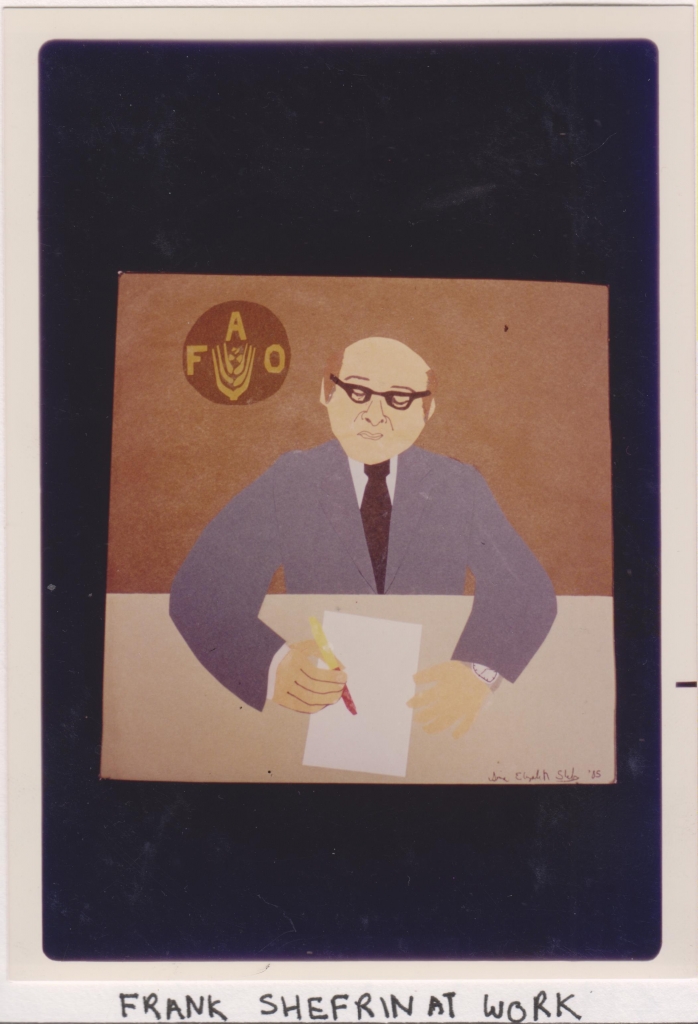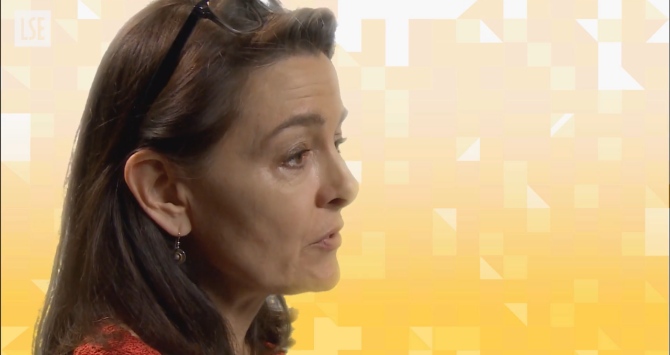From its inception, the World Food Programme, the recipient of the Nobel Peace Prize for 2020, changed the paradigm for international development. This post provides recollections on the paradigm shift by the late Canadian economist Frank Shefrin, one of the program’s founders. The post is authored by behavioural economist Hersh Shefrin, nephew of Frank Shefrin.
Recollections from when the World Food Programme, the 2020 Nobel Peace Prize recipient, changed the paradigm for international development.
Hunger, international development, and peace are interrelated phenomena. This is why on 10 December 2020, the Nobel Peace Prize was awarded to the United Nations World Food Programme (WFP). In announcing the award on October 9, the Nobel Committee stated that WFP would receive the prize “for its efforts to combat hunger, for its contribution to bettering conditions for peace in conflict-affected areas and for acting as a driving force in efforts to prevent the use of hunger as a weapon of war and conflict.” The Committee also noted that WFP is “the world’s largest humanitarian organisation addressing hunger and promoting food security.”
I grew up in Canada, during the 1950s and 1960s, a time when the country was in the process of linking its identity and its foreign policy to the contributions it would make to international development. I watched this process first hand as my father’s oldest brother, Frank Shefrin, was an important member of the team that built WFP from the ground up.
Frank Shefrin was an agricultural economist with the Canadian government. Between 1951 and 1953, he worked in Rome at the FAO headquarters under its chief economist Mordecai Ezekiel, the architect of Franklin Roosevelt’s agricultural policy. In 1959, Frank Shefrin attended the FAO meeting at which Canada’s Minister of Agriculture, Douglas Harkness, first floated the idea of WFP as a trial balloon. After WFP became a reality, in the early 1960s, Frank Shefrin chaired Canada’s Interdepartmental Committee on WFP, working with political leaders such as Mitchell Sharp, Minister of Trade and Commerce. Frank Shefrin would also chair the WFP governing committee.

My uncle was a great influence on me during my formative years. As I grew up, he regularly sent me United Nations publications, told me about his work with WFP, and encouraged me to become an economist. When I was working on my Ph.D. at the LSE, he and my aunt visited my wife and me in London.
Frank Shefrin passed away in 1989. He would have been happy to see that LSE students had become involved with WFP. I am confident he would have been proud as punch about the 2020 Nobel Peace Prize being awarded to the WFP, and suspect he would have tweeted congratulations to David Beasley, current WFP executive director.
#NobelPeacePrize2020 to #UNWorldFoodProgramme: Time to remember Frank Shefrin, among founders of WFP who called the WFP (with some of the pride of authorship) “the greatest success story in the United Nations system.”
— Hersh Shefrin (@HershShefrin) October 12, 2020
I paid a visit to my uncle when he retired from WFP, after 16 years, and we spoke about his career. He repeated much of what he said to me on that visit in an interview with the Canadian Department of Foreign Affairs and International Trade (DFAIT). The DFAIT interview appeared on a website that is now inactive. In the remainder of this post, I present Frank Shefrin’s reflections on WFP in his own words, taken from the DFAIT interview. To sharpen the focus of my uncle’s remarks, I have inserted questions and comments of my own into the text, thereby simulating the kind of conversation which he and I had.
Question to FS: Can you say something about the social goals, available data, and financial resources that defined the environment at the time WFP was conceived and established as a pilot program?
FS: Very soon after FAO was established, the search began for a means to ensure that nobody in the world went to bed hungry and that food surpluses were handled intelligently…
The FAO had done some excellent studies. Mordecai Ezekiel … wrote a top-notch report on using food aid for development. These provided a really good basis for our discussions…
The executive director of FAO came to Ottawa in December 1964, seeking a supplementary contribution … As soon as Addeke Boerma, the executive director, asked for an extra $2 million, Mitchell Sharp said, “I have no problems with that” … I was delighted, because here the political figures were moving really fast.
Question to FS: What do you think made the WFP unique?
FS: What made the WFP an exciting enterprise was that the use of food aid on a continuous basis for economic and social development was … new…. There were no established ground rules to guide the operations. Member governments, their delegates and the WFP secretariat had to make ad hoc decisions. As a result, we were involved all the time in experimentation, and in both rational and irrational debate at the sessions of the governing body of the WFP…
Question to FS: As a behavioural economist, I would be interested in the kinds of operational issues you faced at the beginning of WFP’s existence. What were the architectural challenges?
FS: We worked out rules and regulations… All these rules had to be acceptable to both donor and recipient countries. As you can imagine, the exercise called for a fine balancing act…
The delegates and WFP staff had also to agree on the types of food aid project[s] to support, and this took a good deal of discussion. Some delegations supported only the idea of emergency food aid. Others favoured projects of economic and social development, and there was some disagreement about the priority to be given to either…
I took [a] leave of absence from Agriculture Canada to prepare for the WFP an evaluation study on food aid … My conclusion was that, if they were well managed, these social programs were definitely beneficial in a developmental sense. On the whole, delegates reached a useful compromise and food aid was provided for all these categories…
Question to FS: How impactful was WFP on the structure of food aid?
FS: WFP … influenced changes in the whole structure of food aid. You see, for the first time … the governing body of WFP … brought together representatives from developed and developing countries (or donor and recipient countries) to help shape policies, approve projects and evaluate the results of food aid programs. At first, major donors were dominant in setting the ground rules and making decisions. But the balance shifted a good deal as developing countries became more articulate and assertive…
Comment to readers from me: As I was growing up I learned that whenever my uncle prefaced a remark with the phrase “you see”, he was about to make a key point.
Question to FS: Did WFP generate any controversies? For instance, my Ph.D. supervisor Lucien Foldes thoughtfully wondered whether dumping surpluses might help North American agriculture but undermine agriculture in poor countries. Moreover, is there not a concern that the priority of getting food to people sometimes leads to complicity with abusive governments?
FS: WFP has always aroused strong emotions, for and against, in many circles: among governments, academics, NGOs [Non-Governmental Organizations] and the media…
Not all countries were equally enthusiastic over a multilateral food aid program. Some countries [that] did not have surpluses felt that they should not be expected to help dispose of the surpluses of other countries.
Some projects have been poorly planned; delivery has been slow; food distribution has been badly done; supervision and follow-up has been unsatisfactory.
Other criticism has been based more on emotion than on substance, for example when they refer to WFP food aid as “handouts” and say it encourages laziness and corruption.
But it is fair to say that food aid does not always benefit the poor. Others get the benefit.
Delegates and the secretariat were aware of these weaknesses … At the same time, delegates have to remember that the bottom line in all WFP operations [is] the neediest people. Unfortunately, there has to be a constant reminder of this “bottom line”.
Comment to readers from me: Food aid controversies have only grown more complex since Frank Shefrin’s days with WFP. An academic literature has identified a series of problematic issues in which food aid associated with conflicts in Sri Lanka, Sudan, and Syria appear to have benefitted abusive governments and harmed the long run prospects of the poor in those countries. Some, if not all of these have involved WFP. I always found my uncle to be realistic about food aid, and he consistently told me that “food aid does not always benefit the poor”.
Question to FS: Looking back, how would you assess the value of the contribution which the WFP has made?
FS: When I retired in 1979, I felt qualified to judge the effectiveness of WFP… My experience with other international agencies gave me a broad perspective of United Nations activities. My general conclusion in 1979 was that I felt I could give the World Food Programme high marks… [It was] the greatest success story in the United Nations system.
Livestream of the Noble Prize ceremony available at https://www.nobelprize.org/nobel-week-live-streams-2020/.
The views expressed in this post are those of the author and in no way reflect those of the International Development LSE blog or the London School of Economics and Political Science.





